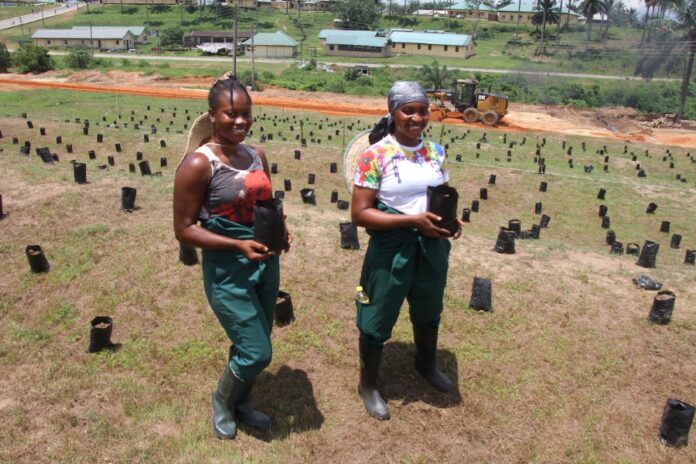Illustrative Image: Boosting Agricultural Education in Africa: How University-Industry Partnerships Improve Innovation, Employability, and Economic Growth
Image Source & Credit: Solidaridad Network
Ownership and Usage Policy
A recent study by Sassi, M., & Mshenga, P. M. (2025) titled “Unlocking the potential of university-industry collaborations in African higher education: A comprehensive examination of agricultural faculties,” published in Industry and Higher Education, reveals that university-industry collaborations within agricultural faculties in African higher education offer substantial benefits but are also challenged by structural and contextual barriers.
“
University-industry collaborations in African agricultural education enhance innovation and employability but face challenges like funding, engagement, and intellectual property.
-Sassi, M., & Mshenga, P. M. 2025
This study explores university-industry collaborations in agricultural faculties across Sub-Saharan Africa, focusing on their role in enhancing higher education outcomes. By examining case studies from eight universities across Eastern, Western, and Northern Africa, the research provides a nuanced understanding of the dynamics, challenges, and benefits associated with integrating industry perspectives into agricultural education. The author reveals that successful collaborations are underpinned by effective institutional management, active stakeholder engagement, and the application of the N-tuple Helix Model, which fosters synergy among academia, industry, government, and other sectors. These partnerships yield significant benefits, including improved student employability, enhanced technology transfer, innovation-driven research, and curricula that align with industry needs. However, the study also identifies persistent challenges such as limited funding, industry reluctance to engage, and concerns around intellectual property rights, all of which can impede progress.
How the Study was Conducted
The study employed a comprehensive qualitative methodology to investigate university-industry collaborations within agricultural faculties at eight African universities participating in the Erasmus+ KA2 AgriENGAGE project. These institutions, located across Eastern, Western, and Northern Africa, provided a diverse and regionally representative sample. Data was collected through structured interviews with academic and administrative staff, offering firsthand insights into the dynamics of collaboration. The interview protocol was pilot-tested with local project directors to ensure clarity and relevance, and data collection was facilitated by local AgriENGAGE coordinators at each university. The research was guided by a modified version of the conceptual framework developed by Rybnicek and Königsgruber (2019), which emphasizes the interplay between institutional structures, relationship dynamics, and output outcomes in university-industry partnerships. To further enhance the analysis, a SWOT (Strengths, Weaknesses, Opportunities, and Threats) framework was applied to identify internal capabilities and external conditions that influence collaborative success. The findings were then validated through comparison with existing literature, ensuring both rigor and relevance. This robust methodological approach enabled the study to deliver a well-rounded and in-depth understanding of the key factors shaping effective university-industry collaborations in African higher education, with a specific focus on agricultural faculties.
What the Authors Found
The study found that university-industry collaborations within agricultural faculties in African higher education offer substantial benefits but are also challenged by structural and contextual barriers. Drawing on case studies from eight universities across Eastern, Western, and Northern Africa, the research highlights that successful partnerships are driven by effective institutional management, active stakeholder engagement, and the integration of the N-tuple Helix Model. These collaborations contribute to improved student employability, enhanced technology transfer, innovation-led research, and industry-relevant curricula. However, their effectiveness is often constrained by limited funding, industry reluctance to engage, and unresolved intellectual property concerns.
Why is this important
Bridging the Skills Gap: Many graduates struggle to find jobs due to a mismatch between academic training and industry needs. Collaborations help align university curricula with real-world industry demands, improving student employability.
Driving Innovation: Universities and industries working together foster technology transfer, research advancements, and problem-solving for agricultural challenges.
Economic Growth: Strong partnerships between academia and industry contribute to job creation, entrepreneurship, and sustainable agricultural development.
Overcoming Challenges: The study identifies barriers such as funding limitations, industry reluctance, and intellectual property concerns, offering solutions to strengthen partnerships.
Policy & Strategy Development: The findings provide actionable recommendations for universities, industries, and policymakers to create effective collaboration frameworks.
What the Authors Recommended
The authors recommends a multifaceted strategy to strengthen university-industry collaborations in African agricultural education, focusing on five key areas:
- Context-Specific Collaboration Models: Universities should design tailored partnership strategies that align with their institutional priorities, regional needs, and available resources.
- Dedicated Management Structures: Establish specialized offices or assign personnel to coordinate industry collaborations, ensuring effective oversight and continuity.
- Enhanced Stakeholder Engagement: Build strong relationships with private companies, government agencies, NGOs, and farming communities to enrich research and practical training opportunities.
- Curriculum and Research Alignment: Integrate industry needs into academic programmes and promote joint research initiatives to improve student employability and drive innovation.
- Supportive Policies and Incentives: Collaborate with government bodies to develop policies that protect intellectual property, and secure funding and incentives to encourage faculty participation in industry partnerships.
In conclusion, the study by Sassi and Mshenga offers a critical and timely examination of university-industry collaborations within agricultural faculties in African higher education. By highlighting both the transformative potential and the persistent barriers of such partnerships, the research underscores the need for strategic, context-sensitive approaches to collaboration. With targeted policy support, dedicated institutional frameworks, and active stakeholder engagement, these partnerships can serve as powerful catalysts for innovation, job creation, and sustainable agricultural development across the continent.
















 The African Research (AR) Index is a comprehensive scholarly directory and database focused explicitly on journal publishers that publish and disseminate African research.
The African Research (AR) Index is a comprehensive scholarly directory and database focused explicitly on journal publishers that publish and disseminate African research.

